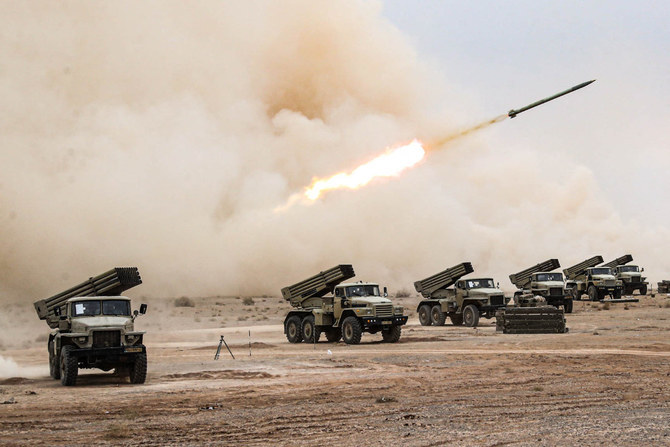DUBAI/JERUSALEM: Explosions echoed over an Iranian city on Friday in what sources described as an Israeli attack, but Tehran played down the incident and indicated it had no plans for retaliation — a response that appeared gauged toward averting region-wide war.
The limited scale of the attack and Iran’s muted response both appeared to signal a successful effort by diplomats who have been working round the clock to avert all-out war since an Iranian drone and missile attack on Israel last Saturday.
Iranian media and officials described a small number of explosions, which they said resulted from Iran’s air defenses hitting three drones over the city of Isfahan. Notably, they referred to the incident as an attack by “infiltrators,” rather than by Israel, obviating the need for retaliation.
An Iranian official said there were no plans to respond against Israel for the incident.
“The foreign source of the incident has not been confirmed. We have not received any external attack, and the discussion leans more toward infiltration than attack,” the official said.
Israel said nothing about the incident. It had said for days it was planning to retaliate against Iran for Saturday’s strikes, the first ever direct attack on Israel by Iran in decades of shadow war waged by proxies which has escalated throughout the Middle East through six months of battle in Gaza.
The United States received advance notice of Israel’s reported strike on Iran but did not endorse the operation or play any part in its execution, US media quoted officials as saying.
NBC and CNN, citing sources familiar with the matter and a US official, respectively, said Israel had provided Washington with pre-notification of the strike.
Various networks cited officials confirming a strike had taken place inside Iran, with CNN quoting one official as stating the target was not a nuclear facility.
The two longstanding foes had been heading toward direct confrontation since a presumed Israeli airstrike on April 1 that destroyed a building in Iran’s embassy compound in Damascus and killed several Iranian officers including a top general.
Iran’s response, with a direct attack on Israel, was unprecedented but caused no deaths and only minor damage because Israel and its allies shot down hundreds of missiles and drones.
Allies including the United States had since been pressing hard to ensure any further retaliation would be calibrated not to provoke a spiral of hostilities. The British and German foreign ministers visited Jerusalem this week, and Western countries tightened sanctions on Iran to mollify Israel.
In a sign of pressure within Israel’s hard-right government for a stronger response, Itamar Ben Gvir, the far-right national security minister tweeted a single word after Friday’s strikes: “Feeble!.”
Countries around the world called on Friday for both sides to avert further escalation.
“It is absolutely necessary that the region remains stable and that all sides restrain from further action,” EU Commission head Ursula von der Leyen said. Similar calls came from Beijing and from Arab states in the region.
In financial markets, global shares eased, oil prices surged and US bond yields fell as traders worried about the risks.
NO MENTION OF ISRAEL
Within Iran, news reports on Friday’s incident made no mention of Israel, and state television carried analysts and pundits who appeared dismissive about the scale.
An analyst told state TV that mini drones flown by “infiltrators from inside Iran” had been shot down by air defenses in Isfahan.
Shortly after midnight, “three drones were observed in the sky over Isfahan. The air defense system became active and destroyed these drones in the sky,” Iranian state TV said.
Senior army commander Siavosh Mihandoust was quoted by state TV as saying air defense systems had targeted a “suspicious object.”
Iranian President Ebrahim Raisi had warned Israel before Friday’s strike that Tehran would deliver a “severe response” to any attack on its territory.
Iran told the United Nations Security Council on Thursday that Israel “must be compelled to stop any further military adventurism against our interests” as the UN secretary-general warned that the Middle East was in a “moment of maximum peril.”
By morning, Iran had reopened airports and airspace that were shut during the strikes.
Still, there was alarm over security in Israel and elsewhere. The US Embassy in Jerusalem restricted US government employees from travel outside Jerusalem, greater Tel Aviv and Beersheba “out of an abundance of caution.”
In a statement, the embassy warned US citizens of a “continued need for caution and increased personal security awareness as security incidents often take place without warning.”
Israel’s assault on Gaza began after Hamas Islamists attacked Israel on Oct. 7, killing 1,200, according to Israeli tallies. Israel’s military offensive has killed about 34,000 Palestinians in Gaza, according to the Gazan health ministry.
Iran-backed groups have declared support for Palestinians, carrying out attacks from Lebanon, Yemen and Iraq, raising fears the Gaza conflict could grow into a wider regional war.
























